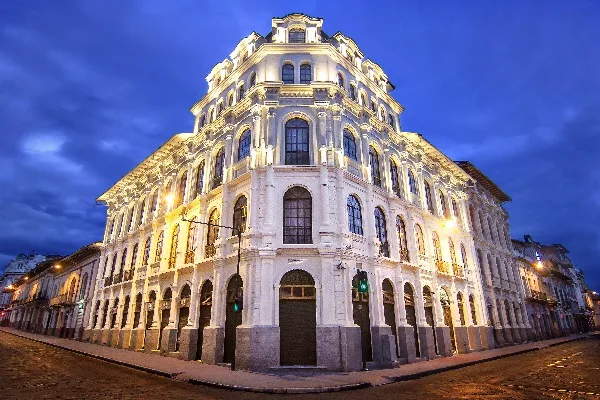Where in the world is U.S. fugitive leaker Edward Snowden, and why would he want to come to Ecuador?
Edward Snowden, the former NSA contractor currently trying to evade a U.S. arrest warrant, has applied for political asylum in Ecuador, a South American republic best known internationally for its dominion over the Galapagos Islands and many years of relative political stability.

The government of populist President Rafael Correa said Monday it is considering Snowden’s request, but if recent history is any indication, it is likely to accept it. Foreign Minister Ricardo Patino said Monday Snowden’s asylum request “has to do with freedom of expression and with the security of citizens around the world.”
However, the notion that Ecuador is a defender of free expression is contradicted by numerous reports: It ranks 119th out of 179 countries on Reporter Without Borders’ Press Freedom Index, and Human Rights Watch says “President Rafael Correa has undercut freedom of the press in Ecuador by subjecting journalists and media figures to public denunciation and retaliatory litigation.”
The Ecuadorian national assembly recently passed a new communications law that journalists say muzzles free speech. The government claims, however, that the press and broadcast media have traditionally been in the hands of big business and that the legislation simply expands the scope of free speech, making it more accessible to citizens. Correa signed the legislation last week
On its surface, the real reason Correa is seriously considering helping Snowden may seem to have more to do with sticking it to the U.S., and while that certainly plays a part, it is not enough of an explanation.
“It goes beyond his own personal feelings of the United States,” said Christopher Sabatini, senior policy director for Americas Society/Council of the Americas, in an interview with CBSNews.com. “It’s sort of a larger project.”
Sabatini said Correa’s decision last year to grant refuge to WikiLeaks’ founder Julian Assange, who has accused the U.S. of trying to illegally detain him for leaking government secrets, and his current decision over whether to take in Snowden are more about “his own desire to serve as a regional leader.”
Additionally, Correa “sees himself as a symbol of anti-imperialism globally, not just in his region,” Sabatini said. “He really sees himself of being a leader of this global zeitgeist against the United States-led drive towards multilateralism.”
Correa was recently reelected to a third and final term as president earlier this year, and making a stand on behalf of Snowden and other like-minded idealists like WikiLeaks is a chance for him to cement a legacy international importance, Sabatini said.
Correa’s feelings for America are surely complicated. Sabatini said Correa’s father was indicted for drug trafficking by the U.S., but he also earned a Ph.D. in Economics from the University of Illinois at Urbana-Champaign in 2001. Several members of his family, including his mother and grandmother, live in Orange County, California. During his first presidential campaign, he told U.S. journalists that he considered himself “half gringo.”
“Relating to the U.S., ours has always been a relationship of affection and friendship but in the framework of mutual respect and sovereignty,” Correa said in a revealing interview with Assange last year. “I love and admire the U.S. people a great deal.”
Still, he has built his political power out of populism, and for many years now South American populism has come to be defined by people like Cuba’s Fidel Castro and Venezuela’s Hugo Chavez. It is in part anti-American, for sure, but it is more about anti-imperialism — many populist South American leaders see themselves as countering American global power.
“Believe me, the last thing I’d be is anti-U.S.,” Correa told Assange. “However I will always call a spade a spade. And if there are international U.S. policies detrimental to our country … I will denounce them strongly, and I will never allow the sovereignty of my country to be affected.”
It is precisely that sentiment that is working against the U.S. in its pursuit of Snowden. U.S. Secretary of State John Kerry has warned of “serious consequences” for those who harbor Snowden, as the U.S. has demanded his extradition from every country he’s popped up in so far. It is easy for the Correas of the world to see this as bullying.
“It’s why the U.S. is struggling to get sympathy on this story,” said Steve Striffler, chair of Latin American Studies at the University of New Orleans. “In the U.S. media, we’re thinking more about, who is this Edward Snowden? Is he a hero? Is he a traitor? Abroad, and certainly in Latin America, their focus is more on U.S. government actions, and seeing those actions in a longer history of surveillance programs that in the case of Latin America supported repressive military dictatorships that were legally backed up. The U.S. is suspect when it comes to the history of surveillance issues.”
Some U.S. polls show a high level of support for Snowden and Republican senator Rand Paul says that Snowden was simply obeying the spirit of the U.S. Constitution by telling the truth about illegal government activity.
Ecuador has many neighbors likely to also push back against perceived American bullying. Attorney Michael Ratner, who represents Assange in the U.S., said Monday in a conference call with reporters if Snowden were his client, he’d also advise seeking asylum for him in Venezuela, Bolivia, Argentina and Cuba.
Correa is unlikely to see any irony in taking in anti-secrecy activists like Assange and Snowden, despite his poor record on freedoms of expression and corruption. For him, South American media has been dominated by corporate interests for too long, and they might as well be colonial masters rigging the game against the will of the people.
“The media has been historically been owned by banks in Ecuador, and historically the media has been aggressively opposed to Correa,” Striffler said.
Correa, the economist, has been aggressively reforming Ecuador’s economy since taking office, and many of his reforms — including greater bank regulations — have worked, Striffler said, much to the chagrin and aggressive opposition of the owners of Ecuador’s media. The power of corporate interests over public information is more pronounced in smaller countries, and that is Correa’s reasoning for attempting to manage forms of expression.
“Let’s stop portraying this image of poor and courageous journalists, saint-like media trying to tell the truth; and tyrants, autocrats and dictators trying to hinder that. It isn’t true. It is the other way around,” Correa said in his interview with Assange. “Often they (the media) insult and slander out of sheer dislike; media (are) devoted to private interests.”
That is a sentiment close to Julian Assange’s heart, and is the main reason why his organization has been assisting Snowden in finding refuge in Ecuador, according to Kristinn Hrafnsson, a WikiLeaks spokesperson who was interviewed by CBSNews.com this past weekend.
“Ecuador authorities have been very supportive of the ideals of WikiLeaks,” said Hrafnsson, even defending Ecuador’s recently adopted anti-media laws as okay because the government is “democratically elected.”
America is unlikely to punish Ecuador should either Assange or Snowden ever make it there, because that would only boost Correa’s populist image at home and abroad, South America expert Sabatini said.
“I think the U.S. will not express over-the-top annoyance,” Sabatini said, adding that historically America has “been careful to not overreact, not to provoke” in Latin America whenever possible.
Still, Snowden’s life is unlikely to be totally carefree even if he reaches Ecuador.
“If there’s a change of government (when Correa’s term ends in 2017) his safe-haven could end,” Sabatini said. Additionally, “the very things that Snowden did (in the U.S.) would’ve been completely criminalized in Ecuador. I assume he’ll want to keep his mouth shut in criticizing the Ecuadoran government.”
Credit: CBS News, www.CBSNews.com; photo caption: President Rafael Correa
















